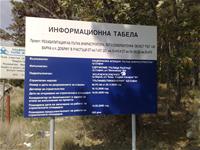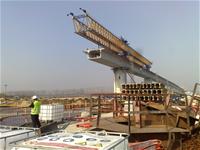The Bulgarian political bubble bust
Adelina Marini, December 10, 2010
 The global financial and economic crisis has revealed problems, in fact quite familiar - the bubble and bust. What exactly is a bubble? This is an idea presented in the most attractive for potential investors way in which all that are convinced that they would have big profits, start investing in. This leads to discrepancies and later on to bust. Such was the case with the real-estate bubble which led the economies of Spain, Ireland and Bulgaria into a serious crisis. It is also an indicator of another thing - beyond construction obviously the things these countries could offer in order to attract investments are not too many.
The global financial and economic crisis has revealed problems, in fact quite familiar - the bubble and bust. What exactly is a bubble? This is an idea presented in the most attractive for potential investors way in which all that are convinced that they would have big profits, start investing in. This leads to discrepancies and later on to bust. Such was the case with the real-estate bubble which led the economies of Spain, Ireland and Bulgaria into a serious crisis. It is also an indicator of another thing - beyond construction obviously the things these countries could offer in order to attract investments are not too many.
Of course the latter is very conditional, especially with regard to Ireland which has a very well developed IT and green technologies sectors that could drag the country out of the crisis no matter its current problems. Spain, although that it ruined its sea coast (just like us), still is very attractive as a tourist destination.
Even further back in time and much before the crisis another big bubble was the dotcom bubble - the furious investment in online companies and services.
The Bulgarian Bubble
In Bulgaria, excluding the construction bubble, another bubble started to emerge - a political one. The new government, headed by Mr Boyko Borissov, who was before a mayor of the capital Sofia, is constantly throwing in the public domain various numbers of released money from the EU funds, of prices of projects, according to which our country must have prospered. The facts, however, speak that this bubble is seriously busting. A key element of the bubble is the constant exposition to media radiation, practically 24/7, with official openings, explanations that in spite of the severe sins of previous governments (especially the previous one), the crisis and other circumstances, the government is managing to build FOR US, to secure FOR US some long-awaited infrastructure projects.
An emblematic case from the time when the PM was a mayor was the  renovation of a section of a key boulevard in Sofia, which with its brand new asphalt pleated in waves. Then Mr Borissov promised that the company that renovated the boulevard would pay for the repairs but this never happened. The same approach was used by the then-Sofia mayor and now a head of government with the plans for the construction of a waste management plant. It was with this plan that the then-mayor clashed with the cabinet of the then-PM Sergey Stanishev.
renovation of a section of a key boulevard in Sofia, which with its brand new asphalt pleated in waves. Then Mr Borissov promised that the company that renovated the boulevard would pay for the repairs but this never happened. The same approach was used by the then-Sofia mayor and now a head of government with the plans for the construction of a waste management plant. It was with this plan that the then-mayor clashed with the cabinet of the then-PM Sergey Stanishev.
The promise then was that in three years (this was almost that much ago) Sofia would have the most modern waste-management plant in the Balkans. There was a path cut through to various highly developed European countries for experience exchange, for finding the best and most suitable technology. Three years later the bubble is already busting because sources from the European Commission said directly that this project was at risk. And it is at risk for many reasons part of which are: the technology itself for waste-recycling is not appropriate; there are remarks on the public procurement procedures.
Without getting into further details of the problems of this project, it is clear that the chances this project to be realised are close to zero. And this is stated by experts with the European Commission, contacted by euinside. No less unrealistic is the longly debated project for the construction of the gas interconnection between Serbia and Bulgaria, which is part of the Nabucco project and is the only one still unclear. Sources in the European Commission say that the Bulgarian authorities will not succeed in realising the project by the end of the current programming period (expiring in 2013).
 Similar is the situation with the Trakiya highway, the project which was returned several times because of irregularities and now it is being worked on but it is not clear when and most of all - how it will be completed. In fact, the question of how is very important and it became especially important on Saturday (December 4) when all over the country it rained for a day, flooding the brand new section of the south catenary of the ring-road around Sofia. The ridiculous in this story are the explanations of all responsible factors that the only reason is the natural disaster that happened. I don't want to think what will happen if there really is a natural disaster and what the scales of the damages would be (but on the issue of natural disasters in another article later on euinside).
Similar is the situation with the Trakiya highway, the project which was returned several times because of irregularities and now it is being worked on but it is not clear when and most of all - how it will be completed. In fact, the question of how is very important and it became especially important on Saturday (December 4) when all over the country it rained for a day, flooding the brand new section of the south catenary of the ring-road around Sofia. The ridiculous in this story are the explanations of all responsible factors that the only reason is the natural disaster that happened. I don't want to think what will happen if there really is a natural disaster and what the scales of the damages would be (but on the issue of natural disasters in another article later on euinside).
The problem is in the constant search of a blame elsewhere. And the reason is simple - hasting to cut the tape and officially open another successful project so that we could be shown on TV and to explain how great we are, in fact we ignore some key periods for deliberation and planning - in the case with the ring-road it would have been enough to think how to make the road in such a way that the waters that flow from the Vitosha mountain, dragging mud, stones and branches, would not harm the road. There are engineering solutions for this for sure.
And another surprise that came from Brussels. For a consecutive time (probably  no one is counting anymore) it appears that the Road Infrastructure Agency does not work efficiently (which is more than obvious) and this is why a department in the Ministry for Regional Development is being set up with the idea this department to take over from the Road Agency. The Bulgarian side was surprised with this revelation, expectedly, but the idea had not been rejected with determination.
no one is counting anymore) it appears that the Road Infrastructure Agency does not work efficiently (which is more than obvious) and this is why a department in the Ministry for Regional Development is being set up with the idea this department to take over from the Road Agency. The Bulgarian side was surprised with this revelation, expectedly, but the idea had not been rejected with determination.
The problem is in centralisation
Another fundamental problem of the Bulgarian political bubble is the severe centralisation of administration. The problem is very serious because according to experts in Brussels there is shortage of projects from small municipalities in Bulgaria, in spite the fact that in general they are more active and faster in preparing them. But as they do not have enough power, they can hardly realise the so necessary for many regions in the country renovation of infrastructure, provision of public services and jobs creation, which on its part leads to depopulation and mass migration both abroad and in larger regional centres. "While the policies are being made in the ministries, these regions will not develop", was the opinion of experts.
 They also pointed out that the countries with strong regional authorities do not have a problem with the leak of people and with depopulation of entire villages and smaller towns. On the contrary - in the countries with strong centralisation there is a process of an extremely fast concentration of people in big regional centres. The danger of this is big because not very far in the future Bulgaria will find itself with ghost-towns, with a severe shortage of skilled workers and with a barely toddling economy because, as another problem the experts in Brussels revealed, the bigger municipalities are more slow in applying for EU funding because in general they apply for big infrastructure projects, the preparation of which takes more time.
They also pointed out that the countries with strong regional authorities do not have a problem with the leak of people and with depopulation of entire villages and smaller towns. On the contrary - in the countries with strong centralisation there is a process of an extremely fast concentration of people in big regional centres. The danger of this is big because not very far in the future Bulgaria will find itself with ghost-towns, with a severe shortage of skilled workers and with a barely toddling economy because, as another problem the experts in Brussels revealed, the bigger municipalities are more slow in applying for EU funding because in general they apply for big infrastructure projects, the preparation of which takes more time.
Even worse is that by the time a large infrastructure project is prepared, it is morally out of date because of the constant increase of population in the regional centres, thus imposing corrections of the already filed projects. It is obvious, however, that the Bulgarian government does not consider decentralisation at all, even on the contrary. In the end of November the minister for EU funds Tomislav Donchev announced that the establishment of a new centralised body is envisaged - a Development Agency. The motives: "The direct contact with regions will be realised through the six planning regions. There will also be some kind of centralisation. The planning regions will define the method of distribution of money. The municipalities will define what projects they will offer and at what costs".
In other words - centralisation again, washed away responsibility again, lack of choice for citizens again. And the funniest thing in the explanations for the need of another round of centralisation is that this has been done in other countries. If we watched what other countries have done in many other areas probably this text would not have been written. Or at least not in this form. But for the current government, as well as for many others before, obviously the bubbling is more important before society. Which for now is a successful strategy, given the fact that the draft legislation for an Elections Code does not give citizens a lot of options to choose. So as long the bubbling continues the bust is coming soon.